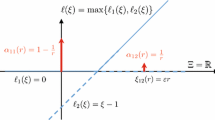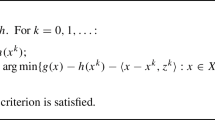Abstract
Epi-convergence is used as an efficient tool in optimization theory. It finds optimal solutions in such a way that it ensures the convergence of infimum values. In some cases, some functions may not conform to an expected pattern and reduce the efficiency of optimization. Moreover, obtaining epi-limit function may fail due to disruption of these functions. For that reason, it may be necessary to use an alternative method that diminishes the effect of such functions by excluding them from consideration. In this paper, we give a sequential characterization of statistical epi-convergence which enables us to eliminate corrupted functions deviate from the majority of the data. Therefore, statistical epi-limit inferior and superior are defined. Then, we show that sequential characterization of statistical epi-convergence is not biconditional as its ordinary definition. At the end, these definitions lead the way through the conditions for statistical convergence of infimum values which is an essential property to solve optimization problems.
Similar content being viewed by others
References
Anastassiou AG, Duman O (2011) Towards intelligent modeling: statistical approximation theory, vol 14. Springer, Berlin
Artstein Z, Wets R (1988) Approximating the integral of multifunction. J Multivar Anal 24:285–308
Attouch H (1977) Convergence de fonctions convexes, de sous-diff’erentiels et semi-groupes. Comptes Rendus de l’Acad’emie des Sciences de Paris 284:539–542
Bagh A (2004) An epi-convergence result for bivariate convex functions. J. Convex Anal 11(1):197–208
Beer G, Lucchetti R (1991) Convex optimization and the epi-distance topology. Trans Am Math Soc 327:795–813
Dupacova J, Wets R (1988) Asymptotic behavior of statistical estimators and of optimal solutions of stochastic optimization problems. Ann Statist 16:1517–1549
Fast H (1951) Sur la convergence statistique. Colloq Math 2:241–244
Fridy JA (1993) Statistical limit points. Proc Am Math Soc 118(4):1182–1192
Fridy JA, Orhan C (1997) Statistical limit superior and limit inferior. Proc Am Math Soc 125:3625–3631
Gökhan A, Güngör M (2002) On pointwise statistical convergence. Indian J Oure Appl Math 33(9):1379–1384
Hess C (1996) Epi-convergence of sequences of normal integrands and strong consistency of the maximum likelihood estimator. Ann Statist 24(3):1298–1315
Jeyalakshmi K (2012) Convergence of Optimization Problems. Bonfring Int J Data Min 2(1):13–16
Joly J-L (1973) Une famille de topologies sur l’ensemble des fonctions convexes pour lesquelles la polarit’e est bicontinue. Journal de Math’ematiques Pures et Appliqu’ees 52:421–441
Kall P (1986) Approximation to optimization problems: an elementary review. Math Oper Res 11(1):9–18
King AJ, Wets R (1991) Epi-consistency of convex stochastic programs. Stoch Stoch Rep 34:83–92
Leclére V (2019) Epi convergence of relaxed stochastic optimization problems. Oper Res Lett 47:553–559
Maso GD (1993) An introduction to \(\Gamma \)-convergence. Boston, vol 8
McLinden L, Bergstrom R (1981) Preservation of convergence of sets and functions in finite dimensions. Trans Am Math Soc 268:127–142
Mosco U (1969) Convergence of convex sets and of solutions of variational inequalities. Adv Math 3:510–585
Niven I, Zuckerman HS (1980) An Introduction to the Theory of Numbers, New York
Pennanen T (2005) Epi-convergent discretizations of multistage stochastic programs. Math Oper Res 30(1):245–256
Rockafellar RT, Wets RJ-B (2009) Variational analysis
Salinetti G, Wets RJ-B (1977) On the relation between two types of convergence for convex functions. J Math Anal Appl 60:211–226
Schoenberg IJ (1959) The integrability of certain functions and related summability methods. Am Math Monthly 66:361–375
Sever Y, Talo Ö, Tortop Ş (2018) Statistical epi-convergence in sequences of functions. J Math Anal 9:65–76
Steinhaus H (1951) Sur la convergence ordinaire et la convergence asymptotique. Colloq Math 2:73–74
Talo Ö, Sever Y, Başar F (2016) On statistically convergent sequences of closed sets. Filomat 30(6):1497–1509
Wets RJ-B (1980) Convergence of convex functions, variational inequalities and convex optimization problems, New York,
Wijsman RA (1964) Convergence of sequences of convex sets, cones and functions. Bull Am Math Soc 70:186–188
Wijsman RA (1966) Convergence of sequences of convex sets, cones and functions II. Trans Am Math Soc 123:32–45
Zervos M (1999) On the epi convergence of stochastic optimization problems. Math Oper Res 24(2):495–508
Zygmund A (1979) Trigonometric series. CambridgeUniversity Press, Cambridge
Author information
Authors and Affiliations
Corresponding author
Ethics declarations
Conflict of interest
The authors declare that they have no conflict of interest.
Ethical approval
This article does not contain any studies with human participants or animals performed by any of the authors.
Additional information
Communicated by V. Loia.
Publisher's Note
Springer Nature remains neutral with regard to jurisdictional claims in published maps and institutional affiliations.
Rights and permissions
About this article
Cite this article
Tortop, Ş., Sever, Y. & Talo, Ö. Sequential characterization of statistical epi-convergence. Soft Comput 24, 18565–18571 (2020). https://doi.org/10.1007/s00500-020-05092-3
Published:
Issue Date:
DOI: https://doi.org/10.1007/s00500-020-05092-3




